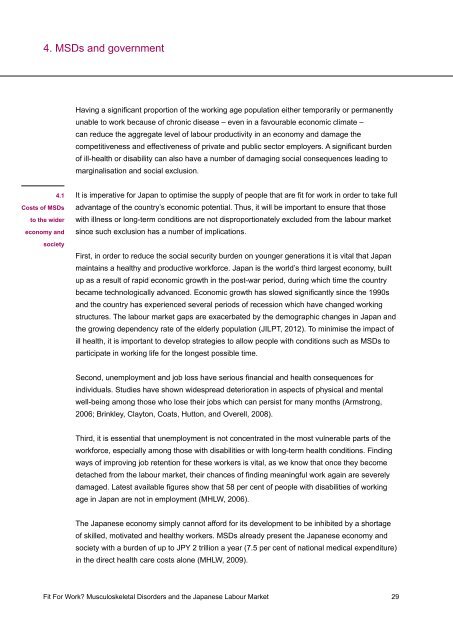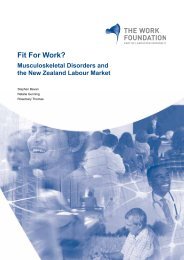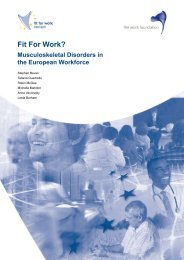English version - Fit for Work Europe
English version - Fit for Work Europe
English version - Fit for Work Europe
Create successful ePaper yourself
Turn your PDF publications into a flip-book with our unique Google optimized e-Paper software.
4. MSDs and government<br />
4.1<br />
Costs of MSDs<br />
to the wider<br />
economy and<br />
society<br />
Having a significant proportion of the working age population either temporarily or permanently<br />
unable to work because of chronic disease – even in a favourable economic climate –<br />
can reduce the aggregate level of labour productivity in an economy and damage the<br />
competitiveness and effectiveness of private and public sector employers. A significant burden<br />
of ill-health or disability can also have a number of damaging social consequences leading to<br />
marginalisation and social exclusion.<br />
It is imperative <strong>for</strong> Japan to optimise the supply of people that are fit <strong>for</strong> work in order to take full<br />
advantage of the country’s economic potential. Thus, it will be important to ensure that those<br />
with illness or long-term conditions are not disproportionately excluded from the labour market<br />
since such exclusion has a number of implications.<br />
First, in order to reduce the social security burden on younger generations it is vital that Japan<br />
maintains a healthy and productive work<strong>for</strong>ce. Japan is the world’s third largest economy, built<br />
up as a result of rapid economic growth in the post-war period, during which time the country<br />
became technologically advanced. Economic growth has slowed significantly since the 1990s<br />
and the country has experienced several periods of recession which have changed working<br />
structures. The labour market gaps are exacerbated by the demographic changes in Japan and<br />
the growing dependency rate of the elderly population (JILPT, 2012). To minimise the impact of<br />
ill health, it is important to develop strategies to allow people with conditions such as MSDs to<br />
participate in working life <strong>for</strong> the longest possible time.<br />
Second, unemployment and job loss have serious financial and health consequences <strong>for</strong><br />
individuals. Studies have shown widespread deterioration in aspects of physical and mental<br />
well-being among those who lose their jobs which can persist <strong>for</strong> many months (Armstrong,<br />
2006; Brinkley, Clayton, Coats, Hutton, and Overell, 2008).<br />
Third, it is essential that unemployment is not concentrated in the most vulnerable parts of the<br />
work<strong>for</strong>ce, especially among those with disabilities or with long-term health conditions. Finding<br />
ways of improving job retention <strong>for</strong> these workers is vital, as we know that once they become<br />
detached from the labour market, their chances of finding meaningful work again are severely<br />
damaged. Latest available figures show that 58 per cent of people with disabilities of working<br />
age in Japan are not in employment (MHLW, 2006).<br />
The Japanese economy simply cannot af<strong>for</strong>d <strong>for</strong> its development to be inhibited by a shortage<br />
of skilled, motivated and healthy workers. MSDs already present the Japanese economy and<br />
society with a burden of up to JPY 2 trillion a year (7.5 per cent of national medical expenditure)<br />
in the direct health care costs alone (MHLW, 2009).<br />
<strong>Fit</strong> For <strong>Work</strong>? Musculoskeletal Disorders and the Japanese Labour Market 29







